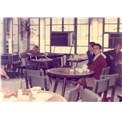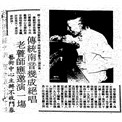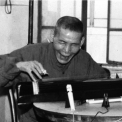-
History & Society
- Education in Pre-war Hong Kong
- History of Taikoo Sugar Refinery
- Hong Kong Products Exhibition
- Local Festivals Around the Year
- Post-war Industries
- Pre-war Industry
- The Hong Kong Jockey Club Archives
- Tin Hau Festival
- Memories We Share: Hong Kong in the 1960s and 1970s
- History in Miniature: The 150th Anniversary of Stamp Issuance in Hong Kong
- A Partnership with the People: KAAA and Post-war Agricultural Hong Kong
- The Oral Legacies (I) - Intangible Cultural Heritage of Hong Kong
- Hong Kong Currency
- Hong Kong, Benevolent City: Tung Wah and the Growth of Chinese Communities
- The Oral Legacies Series II: the Representative List of the Intangible Cultural Heritage of Hong Kong
- Braving the Storm: Hong Kong under Japanese Occupation
- A Century of Fashion: Hong Kong Cheongsam Story
Geography & EnvironmentArt & Culture- Calendar Posters of Kwan Wai-nung
- Festival of Hong Kong
- Ho Sau: Poetic Photography of Daily Life
- Hong Kong Cemetery
- Sketches by Kong Kai-ming
- The Culture of Bamboo Scaffolding
- The Legend of Silk and Wood: A Hong Kong Qin Story
- Journeys of Leung Ping Kwan
- From Soya Bean Milk To Pu'er Tea
- Applauding Hong Kong Pop Legend: Roman Tam
- 他 FASHION 傳奇 EDDIE LAU 她 IMAGE 百變 劉培基
- A Eulogy of Hong Kong Landscape in Painting: The Art of Huang Bore
- Imprint of the Heart: Artistic Journey of Huang Xinbo
- Porcelain and Painting
- A Voice for the Ages, a Master of his Art – A Tribute to Lam Kar Sing
- Memories of Renowned Lyricist: Richard Lam Chun Keung's Manuscripts
- Seal Carving in Lingnan
- Literary Giant - Jin Yong and Louis Cha
Communication & Media- Hong Kong Historical Postcards
- Shaw Brothers’ Movies
- Transcending Space and Time – Early Cinematic Experience of Hong Kong
- Remembrance of the Avant-Garde: Archival Camera Collection
- Down Memory Lane: Movie Theatres of the Olden Days
- 90 Years of Public Service Broadcasting in Hong Kong
- Multifarious Arrays of Weaponry in Hong Kong Cinema
-
History & SocietyGeography & EnvironmentArt & Culture
-
View Oral History RecordsFeatured StoriesAbout Hong Kong Voices
-
Hong Kong MemoryThe Oral Legacies Series II: The Representative List of the Intangible Cultural Heritage of Hong KongRecently Visited
Nanyin in Hong Kong
Nanyin (Southern tunes) is a form of narrative singing in the Cantonese dialect popular in the Pearl River Delta. Together with yue’ou (“Cantonese vernacular singing”), longzhou (“songs sung by itinerant singers holding wooden dragon boat-shaped piece”), muyu (“song sung in free rhythm”) and banyan (“beat pattern singing”), they are the important components of the vernacular ballad-singing of Guangdong.
Nanyin started to find its presence in Hong Kong at the beginning of the 20th century. As its popularity grew, it became a folk song-art that won a large following. There was a piece of nanyin lyrics in The Chinese Mail on 9th January, 1917 entitled, The Beggar’s Lament – it goes to show how popular the singing genre was at the time. Even literati were eager to contribute new lyrics, the contents of which were often topical issues about the life of the people.
Before the 1920s, nanyin was almost invariably sung by blind artists, the men being called gushi, and the female, shiniang. They might be itinerant singers who made this their living, or hired to perform on celebratory occasions, banquets, birthdays of deities etc., in teahouses, taverns, private homes and brothels.
The genre was slowly incorporated into Cantonese opera and Cantonese operatic song towards the beginning of the 20th century. The teahouses began to hire actresses instead of the blind artists to perform. Fortunately by the 1950s and 1960s, there were still programmes on Commercial Radio and Radio Hong Kong (later Radio Television Hong Kong) dedicated to nanyin and Cantonese operatic songs, with both male and female blind artists invited to sing. The most prominent figure among them was Dou Wun. Between 1955 and 1970, his voice could be heard on Radio Hong Kong singing nanyin. His repertoire included long narrative tunes that could last for a few months. This was a time when nanyin could widen its audience base significantly. But gradually, as the social environment changed and other forms of mass entertainment and music genres took over, nanyin began to phase out.
Photos
Copyright © 2012 Hong Kong Memory. All rights reserved.












